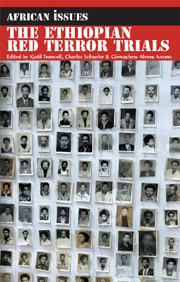Book contents
- Frontmatter
- Contents
- Notes on Contributors
- Preface
- Acknowledgements
- Abbreviations
- Glossary of Amharic Phrases
- 1 The ‘Red Terror’ Trials
- 2 The History of the Red Terror
- 3 The Rights of the Accused
- 4 The Role of the Special Prosecutor's Office
- 5 The Red Terror Trials versus Traditions of Restorative Justice in Ethiopia
- 6 A Quest for Justice or the Construction of Political Legitimacy?
- 7 Building State & Nation
- 8 Beyond the Red Terror Trials
- 9 Concluding the Main Red Terror Trial
- Index
5 - The Red Terror Trials versus Traditions of Restorative Justice in Ethiopia
Published online by Cambridge University Press: 12 September 2012
- Frontmatter
- Contents
- Notes on Contributors
- Preface
- Acknowledgements
- Abbreviations
- Glossary of Amharic Phrases
- 1 The ‘Red Terror’ Trials
- 2 The History of the Red Terror
- 3 The Rights of the Accused
- 4 The Role of the Special Prosecutor's Office
- 5 The Red Terror Trials versus Traditions of Restorative Justice in Ethiopia
- 6 A Quest for Justice or the Construction of Political Legitimacy?
- 7 Building State & Nation
- 8 Beyond the Red Terror Trials
- 9 Concluding the Main Red Terror Trial
- Index
Summary
Introduction
After marching into Arat Kilo, the government headquarters in Addis Ababa, the Ethiopian People's Revolutionary Democratic Front (EPRDF) declared victory over Mengistu's Marxist regime and committed itself to restoring human rights, ensuring the rule of law, initiating representative government and pursuing capitalist development. Expectations were exceedingly high in the early 1990s. Among the immediate problems facing the EPRDF in 1991 was what to do with the high-ranking Derg officials who carried out the Red Terror and were accused of committing genocide against students, intellectuals and other persons deemed threatening to the survival of the military junta. Resolving these gross human rights abuses was considered central in the Transitional Government of Ethiopia's (TGE) attempt to move beyond the immediate, bloody past and bring about reconciliation between parties and ethnic factions. Certainly there are numerous examples of reconciliation in Ethiopian history. At the state level, conflict resolution is as prominent a feature of the imperial chronicles as is warfare. Both modern and religious educational curricula dwell upon the country's peace treaties emphasizing levels of financial restitution and a wide range of charitable acts towards defeated foes with the aim of promulgating Ethiopia's efforts at peace building by emphasizing various methods of restorative justice. What is perplexing is the basic disregard for traditional restorative justice methods that the EPRDF was aware of, yet rejected in favour of a trial when contemplating what to do with Derg officials.
- Type
- Chapter
- Information
- The Ethiopian Red Terror TrialsTransitional Justice Challenged, pp. 68 - 83Publisher: Boydell & BrewerPrint publication year: 2009



